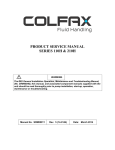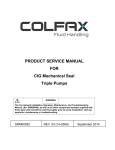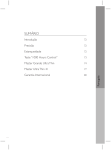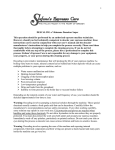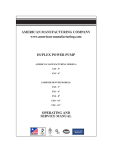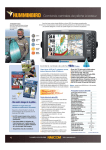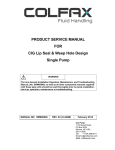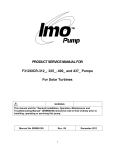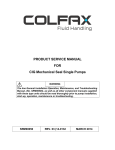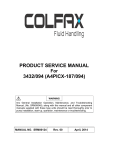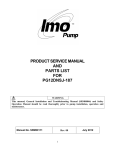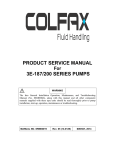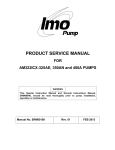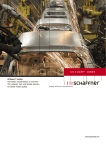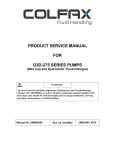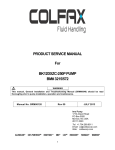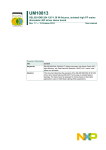Download PRODUCT SERVICE MANUAL SERIES 4U AND 6U
Transcript
PRODUCT SERVICE MANUAL SERIES 4U AND 6U SERIES 4T AND 6T ROTOR SIZES 118 - 250 WARNING The IMO General Installation Operation, Maintenance and Troubleshooting Manual, (No. SRM00046), this manual, and associated component manuals supplied with the unit should be read thoroughly prior to pump installation, start-up, operation, maintenance or troubleshooting. Manual No. SRM00026 Rev. 04 (14-0159) 1 Date: April, 2014 READ THIS ENTIRE PAGE BEFORE PROCEEDING FOR SAFETY OF PERSONNEL AND TO PREVENT DAMAGE TO EQUIPMENT, FOLLOWING NOMENCLATURE HAS BEEN USED IN THIS MANUAL: DANGER Failure to observe precautions noted in this box can result in severe bodily injury or loss of life. WARNING Failure to observe precautions noted in this box can cause injury to personnel by accidental contact with equipment or liquids. Protection should be provided by user to prevent accidental contact. CAUTION ATTENTION Failure to observe precautions noted in this box can cause damage or failure of equipment. Noncompliance of safety instructions identified by the following symbol could affect safety for persons: Safety instructions where electrical safety is involved are identified by: Safety instructions which shall be considered for reasons of safe operation of pump and/or protection of pump itself are marked by sign: ATTENTION ATTENTION If operation of this pump is critical to your business, we strongly recommend you keep a spare pump or major repair kit in stock at all times. As a minimum, a minor repair kit (o-rings, gaskets, shaft seal and bearings) should be kept in stock so pump refurbishment after internal inspection can be accomplished. Table of Contents A. GENERAL INSTRUCTIONS ................................................................................................................................................. 3 B. INTRODUCTION ............................................................................................................................................................... 3 C. DESCRIPTION OF EQUIPMENT ......................................................................................................................................... 3 D. PUMP MODEL IDENTIFICATION....................................................................................................................................... 4 E. ORDERING INSTRUCTIONS .............................................................................................................................................. 4 F. OPERATION...................................................................................................................................................................... 5 F.1 LIQUID LIMITATIONS ...................................................................................................................................................... 5 F.2 OPERATING LIMITS ......................................................................................................................................................... 5 G. PART LIST ......................................................................................................................................................................... 6 H. MAINTENANCE ................................................................................................................................................................ 6 H.1 GENERAL COMMENTS ................................................................................................................................................... 6 H.2 TOOLS REQUIRED .......................................................................................................................................................... 7 H.3 PUMP DISASSEMBLY...................................................................................................................................................... 7 H.4 PUMP ASSEMBLY ............................................................................................................................................................ 8 ASSEMBLY DRAWINGS ..........................................................................................................................................................11 2 A. GENERAL INSTRUCTIONS This manual cannot possibly cover every situation connected with installation, operation, inspection, and maintenance of equipment supplied. Every effort was made to prepare text of manual so that engineering and design data is transformed into the most easily understood wording. Imo Pump must assume personnel assigned to operate and maintain supplied equipment and apply this instruction manual have sufficient technical knowledge and are experienced to apply sound safety and operational practices which may not be otherwise covered by this manual. WARNING If installation, operation, and maintenance instructions are not correctly and strictly followed and observed, injury to personnel or serious damage to pump could result. Imo Pump cannot accept responsibility for unsatisfactory performance or damage resulting from failure to comply with instructions. B. INTRODUCTION This instruction manual covers IMO Pump Division Series 4U and 6U and Series 4T and 6T pumps. These two series of IMO pumps have been designed to meet requirements of hydraulic industry in medium flow ranges. Because of large number of operating conditions, it is necessary to have a variety of construction and material combinations to meet job requirements. Model of each pump is identified on pump nameplate. Specific models discussed in this manual are identified in Table I below by Figure Numbers only. Correct use of this manual requires proper identification of Figure(s) applicable to pump assembly and seal arrangement. Refer to assembly drawings, Figures 7 through 15, for pump identification and mechanical seal drawings, Figures 3 through 6 for applicable seal selection. Model designators are identified in Figures 1 and 2. Table 1 Series 4U, 6U, 4T, and 6T Pumps Pump Model Rotor Size Pump Fig. No. Seal Fig. No. Pump Model Rotor Size Pump Fig. No. Seal Fig. No. 4UVC 6UVC 4UVF 6UVF 4UVC 6UVC 4UVF 6UVF 6UKC 4TVFCS 6TVFCS 4TVTFCS 6TVTFCS 137-200 118-200 137-200 118-200 218-250 218-250 218-250 218-250 156 137-200 137-200 137-200 137-200 7 7 8 8 9 9 10 10 11 12 12 12 12 3 3 3 3 3 3 3 3 4TVFCS 6TVFCS 4TVTFCS 6TVTFCS 4TXS 6TXS 4TXS 6TXS 4TXS 6TXS 218-250 218-250 218-250 218-250 137-156 137-156 187-200 187-200 218-250 218-250 14 14 14 14 12 12 12/13 12/13 14 14 3 3 3 3 4 4 5 5 6 6 187 187 15 15 3 3 3 3 4TXCFS 6TXCFS C. DESCRIPTION OF EQUIPMENT Series 4U and 6U and Series 4T and 6T pumps are positive displacement, rotary screw pumps consisting of a precision bored housing which encloses a driven screw (power rotor) and two intermeshing following screws (idler rotors). These screws when rotating form a succession of closures or cavities. As they rotate, fluid is moved axially from inlet port to outlet port in a continuous, uniform flow with minimum fluid pulsation and pump noise. 3 D. PUMP MODEL IDENTIFICATION FIGURE 1. DEFINITIONS OF MODEL DESIGNATORS FOR SERIES 4U AND 6U FIGURE 2. DEFINITIONS OF MODEL DESIGNATORS FOR SERIES 4T AND 6T E. ORDERING INSTRUCTIONS When corresponding with Imo Pump regarding Series 4U and 6U and Series 4T and 6T pumps, refer to pump nameplate, this instruction manual, and assembly drawing as instructed below: • From pump name plate, record pump model number, serial number, and manufactured date. • Record instruction manual number, revision, and date. • From instruction manual, record figure numbers that apply to replacement part(s). • From assembly drawing or parts list (Table 3) provide IDP number(s) and names for replacement part(s). • Give above information to you Imo service representative. Imo sales and service representatives are listed herein and in the General Instruction Manual, SRM00046. 4 F. OPERATION F.1 LIQUID LIMITATIONS Never operate with thin liquids suck as solvents or water. Pump is designed for liquids having general characteristics of oil. F.2 OPERATING LIMITS CAUTION ATTENTION Operating conditions, such as speed, fluid viscosity, temperature, inlet pressure, discharge pressure, filtration, duty cycle, drive type, mounting, etc., are interrelated. Due to these variable conditions, specific application limits may be different from operational limitations. Equipment must not be operated without verifying system operation requirements are within pump’s capabilities. Under no circumstances should following operating limits specified in table 2 be exceeded without specific approval from Imo Pump. MAXIMUM SPEED ROTOR SIZE MAXIMUM RPM 118 5400 137-156 4400 187-250 3600 Contact IMO Pump Division for Performance Tables VISCOSITY 4U AND 6U 4T AND 6T MINIMUM: 33 SSU 33 SSU MAXIMUM: 3000 SSU 3000 SSU Contact IMO Pump Division for minimum allowable operating viscosity at specific speeds and pressure TEMPERATURE 0 - 160° F PRESSURE MAXIMUM SUCTION MAXIMUM DRIVE FILTRATION 4U AND 4T 6U AND 6T 1500 PSIG 2500 PSIG Contact IMO Pump Division for Performance Tables 4U AND 6U 4T AND 6T 50 PSIG 100 PSIG *Discharge pressure must always be 50 PSIG above suction pressure* Direct Only 60 Mesh minimum recommended Table 2 – Normal Pump Operating and Structural Limits SPECIAL NOTE Series 4U and 6U and Series 4T and 6T units can be operated as hydraulic motors by reversing the rotation of the unit when used as a pump. High pressure inlet of motor is the same as high pressure outlet of the pump. Low pressure outlet of the motor is the same as low pressure inlet of the pump. When ordering replacement parts for units used as motors, refer to List of Materials, Table 3, keeping in mind that parts listed are for pump units. Example (001) Outlet Cover is Inlet Cover for unit used as a hydraulic motor. 5 G. PART LIST lDP NO. PART DESCRIPTION lDP NO. 001 002 003 (3) 004 006 (1)(4) 007 (2) 008 009 010 (2) 011 (2) 014 (2) 015 (2) Cover Inlet Head Capscrew (6) Nut (6) Gasket Balance Piston Bushing Retainer Bolt (4) Power Rotor Idler (2) Stop Housing Sub-Assembly 019 (2) PART DESCRIPTION lDP NO. Spacer Sub-Assembly 046 047 048 049 050 (1) 051 052 053 054 (1) 055 056 057 (1) 058 059 060 061 062 (Includes Items 059 and 060) 020 (1) 021 (1) 022 027 (2) 028 (2) 031 032 035 (1) 036 (2) 041 (Includes item 042 and 058) 042 0-ring 043 016 (1) Capscrew (12) Seal 044 (2) 017 (5)(2) 045 018 (1) Ball Bearing Truarc Ring (2) Key Capscrew (2) Plate Nameplate Drive Screw (2) Back-Up Ring Clamp Ring Spacer (2) Spring Pin Spacer Capscrew (2) Nameplate PART DESCRIPTION Tube Drive Screw (3) Plug Connector 0-ring Capscrew (4) Lockwasher (4) Connector 0-ring Capscrew (4) Lockwasher (4) Gasket Housing Spacer Spring Pin 0-ring Sleeve Quantities are one (1) except when noted in parentheses after part description. (1) Minor Repair Kit items. (2) Major Repair Kit items. (Items marked (1) are included in Major Repair Kit.) (3) Quantity twelve (12) for Figures 12, 14 and 15. (4) Part description 0-ring for Figures 12, 14 and 15. (5) Quantity sixteen (16) for Figures 12, 14 and 15. H. MAINTENANCE DANGER BEFORE working on equipment, make sure all power to equipment is disconnected and locked-out. WARNING Failure to observe precautions while installing, inspecting and maintaining pump can cause injury to personnel form accidental handling of liquids that may harm skin or clothing, or fire hazard risks from flammable liquids, or injury from high pressure fluid jets. H.1 GENERAL COMMENTS Note: Part number identifiers (IDP) contained with parenthesis, such as (9), refer to numbers on assembly drawings. *De-energize driver before starting with any maintenance action.* H.2 TOOLS REQUIRED Procedures described in this manual require common mechanics hand tools, a torque wrench, dial indicators for alignment and a suitable lifting device such as slings, straps, etc. 6 Figure 3. Mechanical Seal Drawing (Single Spring, Bellows Type) *4T, 6T – O-ring Type ; 4U, 6U – “J” Type* Figure 4. O-Ring Type Seal Seat Adapter Figure 5. J Seat Seal Spacer H.3 PUMP DISASSEMBLY Determine pump model identification on pump nameplate to select applicable pump assembly. Refer to that assembly for the following instructions. CAUTION ATTENTION Fluid leakage from disassembly of pump may make floor slippery and cause personal injury. 1. Close off suction and discharge piping to pump and disconnect piping. Remove pump from driver, coupling and mounting bracket. Remove coupling hub and key (022). 2. Remove nuts (004), capscrews (003), and inlet head (002). Remove gasket (006, Figures 7, 8, 9, 10, and 11) or 0-ring (006, Figures 12, 14 and 15) from cover (001). 3. Remove capscrews (027), plate (028) and spacers (041). 4. Remove idler rotors (011) by unscrewing idler rotors from housing bores. CAUTION ATTENTION Do not permit idlers (011) to drop as they emerge from housing (015). 7 5. Remove bolts (009) and bearing retainer (008). 6. Slide assembled power rotor (010) from pump. Removal of assembled power rotor includes: (Figures 7, 8, 9, 10, 12, 13 and 14)- Truarc rings (021), ball bearing (020), spacer (019), mechanical seal (018) and spacer (062, Figure 13 only). (Figures 11 and 15)- Truarc rings (02I) and ball bearing (020). 7. Remove inboard truarc ring (referencing the pump shaft/keyway as inboard side) from power rotor (010). 8. Using an arbor press, press bearing ½” off shaft in order to access outboard truarc ring (021). 9. Remove outboard truarc ring (021). 10. Using an arbor press, remove bearing from power rotor. 11. Remove seal seat adapter and O-ring (gasket)/spacer, “J” seat, and gasket from power rotor. 12. Slide rotating assembly off the power rotor (assembly consist of spring holder, spring, bellows, drive band, and rotating ring) 13. (Figure 11 Only) Remove spacers (019, 018 and 046) from cover (001). 14. (Figure 15 Only) Remove spacer (019) and gasket (057) from cover (001). 15. Remove gasket or O-ring from mechanical seal bore of cover (001). (Figures 7, 8, 9 and 10) - Gasket furnished with mechanical seal (018). (Figures 12, 13 and 14)- Gasket (057, Figures 12 and 14), O-ring (061, Figure 13). 16. Remove capscrews (017) and slide housing (015) from outlet end of cover (001). Removal of housing (015) also removes clamp rings (036), spring pin (042), 0-ring (016) and backup ring (035). Remove 0ring (016), backup ring (035) and clamp rings (036) from housing (015). 17. Remove capscrews (044) and idler stop (014). 18. (Figures 7, 8, II, 12, and 15) Slide spacer (043) from cover (001). 19. Remove bushing (007) from cover (001). H.4 PUMP ASSEMBLY Prior to assembly of pump, all parts should be cleaned and inspected for nicks and burrs. Replace all worn or damaged parts. Colfax recommends replacing all O-rings, gaskets, mechanical seals and ball bearings when these parts are disturbed from their previously installed positions. Refer to proper assembly drawings, Figures 7 through 15, mechanical seal drawing, List of Materials, Table 3, during assembly. Coat all parts with light lubricating oil to assist in assembly. NOTE: Unless noted, assembly procedures apply to all pumps, Figures 7 through 15. 1. Install bushing (007) in cover (001). 2. (Figures 7, 8, 11, 12 and 15) Install spacer (043) in cover (001). 3. Install idler stop (014) to cover (001) using capscrews (044). Torque capscrews (044) to 10 lbs. ft. (± 2 lbs. ft.). 4. Insert 0-ring (016) and backup ring (035) into groove of housing (015). 8 NOTE: Backup ring (035) must be positioned on side of groove toward clamp ring (036) slot. 5. Install rotor housing (015) in cover (001). NOTE: Do not insert housing (015) past clamp ring grooves. 6. Install clamp rings (036) in grooves of housing (015). NOTE: Clamp ring (036) with slot on inside diameter fits over spring pin (042) in housing (015). 7. Install capscrews (017) in clamp rings (036) and torque capscrews (017) to proper value shown in Table 2. 8. (Figure 11 Only) Install spacers (046, 018 and 019) in cover (001). 9. (Figure 15 Only) Install gasket (057) and spacer (019) in cover (001). CAUTION ATTENTION Coat all parts of mechanical seal with oil prior to assembly on power rotor. NOTE: Rotating Assembly: The rotating assembly is normally packaged as an assembly for ease of installation. Ensure that all O-rings are properly positioned in assembly prior to installation. *Assemble the mechanical seal/ bearing assembly onto the power rotor (Steps 10-15)* 10. Slide rotating assembly onto power rotor with rotating assembly positioned next to stepcut shoulder of power rotor. 11. (O-ring type)-Install stationary seal seat into seal seat adapter, ensuring that slot in seal face is aligned with roll pin. (“J” type/O-ring type)- Install gasket/O-ring (see drawings for correct IDP number) furnished with mechanical seal on cover (001). 12. Install seal seat adapter/ “J” seat and spacer onto power rotor. 13. Install truarc rings on outboard groove of power rotor. 14. Using an arbor press, press bearing until inner race of bearing makes contact with truarc rings. Install truarc rings in inboard groove of power rotor. This secures bearing inner race into position. (optional) Heat bearing, using a bearing heater/induction heater, to 200° F and slide bearing into position. Mechanical seal must then be manual compressed to install inboard truarc ring. 15. Slide assembled power rotor (010) into outlet cover (001) ensuring that all parts are properly positioned. 16. Install bearing retainer (008) to cover (001) using bolts (009). Torque bolts (009) to 25 lbs. ft. (± 2lbs. ft.). 17. Insert idlers (011) by screwing them into rotor housing (015) bores. 18. Install spacers (041) and plate (028) using capscrews. Torque capscrews (027) to proper value listed in Table 3. 19. (Figures 12, 14 and 15) Install 0-ring (006) in groove of cover (001). 20. (Figures 7, 8, 9, 10 and 11) Install gasket (006) on cover (001). 9 21. Install inlet head (002) using capscrews (003) with nuts (004). Torque capscrews (003) to necessary value listed in Table 3. 22. Mount pump to bracket. Install key (022) and coupling hub. Connect driver and piping. NOTE: (Figures 12, 14 and 15) If inlet and outlet connectors were removed from pump, O-rings should be replaced during re-assembly. TABLE 3 – TORQUE VALUES Part Capscrew (003) Capscrew (017) Capscrew (027) Rotor Size Torque Values Special Instructions 118 137-156 187-200 218-250 (U) 218-250 (T) 118 137-156 187-200 218-250 118 137-156 187-200 218-250 50 lbs. ft. (+ 2 lbs. ft.) 52 lbs. ft. (+ 2 lbs. ft.) 52 lbs. ft. (+ 2 lbs. ft.) 100 lbs. ft. (+ 2 lbs. ft.) 75 lbs. ft. (+ 2 lbs. ft.) 80 lbs. ft. (+ 5 lbs. ft.) 80 lbs. ft. (+ 5 lbs. ft.) 110 lbs. ft. (+ 5 lbs. ft.) 300 lbs. ft. (+ 10 lbs. ft.) 25 lbs. ft. (+ 2 lbs. ft.) 40 lbs. ft. (+ 2 lbs. ft.) 80 lbs. ft. (+ 2 lbs. ft.) 150 lbs. ft. (+ 2 lbs. ft.) NOTE: Inlet head (002) can be rotated to suit suction pipe arrangements as follows: 4U and 6U, Rotor Sizes 118 through 156 - 60° increments 4U and 6U, Rotor Sizes 187 through 250 - 45° increments 4T and 6T - 90° increments *Remove capscrews (003) with nuts (004) and rotate inlet head (002). Ensure that gasket (006) or 0-ring (006) between inlet head and cover (001) is not damaged. If gasket or 0-ring is damaged, it must be replaced to prevent air leakage. When replacing capscrews (003), torque capscrews to value given in Table 3.* I. TROUBLESHOOTING For assistance with troubleshooting see General Instruction Manual, SRM00046. J. FIELD AND FACTORY SERVICE AND PARTS Imo Pump maintains a staff of trained service personnel that can provide pump installation, pump startup, maintenance/overhaul and troubleshooting supervision as well as installation and maintenance training. Our factories provide maintenance as well as overhaul and test facilities in event user prefers to return pumps for inspection or overhaul. Factory-overhauled pumps are normally tested and war anted “as-new” for a period of one year from date of shipment. For either field service or factory overhaul assistance, contact your local Imo Sales Office or representatives at Technical/Customer Service Department in Monroe, NC, USA. Most pumps have repair kits available Minor Repair Kits are used to repair leaking seals, bad bearings and/or for re-assembly after pump tear-down. They include (as applicable) pump shaft seals, packing, all gaskets/O-rings and bearings. Major Repair Kits are sufficient to rebuild completely worn-out pumps to “as-new” condition. They include all parts found in the Minor Repair Kits plus all major internal parts subject to wear. Since kits have all necessary parts, kit purchase is preferred rather than selecting individual parts. When parts are individually selected from Parts List, some needed components are often overlooked. In addition, mixing worn or used parts with new parts risks rapid wear and shortened service life from new parts. 10 11 FIGURE 9. 12 13 FIGURE 12. FIGURE 13. 14 FIGURE 14. 15 IMO Pump 1710 Airport Road -28110 PO Box 5020 Monroe, NC/USA 28111-5020 Tel: 1+(704) 289-6511 +1.877.853.7867 Fax: 1+(704) 289-9273 Email: [email protected] Web: www.imo-pump.com © 2012 Colfax Fluid Handling all rights reserved. 16
















